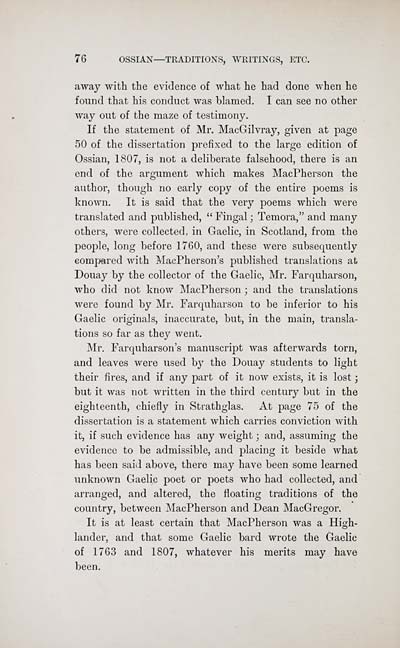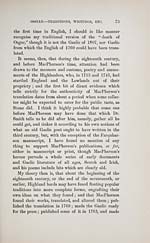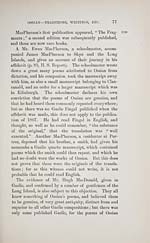Download files
Complete book:
Individual page:
Thumbnail gallery: Grid view | List view

76 OSSIAN — TRADITIONS, WRITINGS, ETC.
away with the evidence of what he had done when he
found that his conduct was blamed. I can see no other
way out of the maze of testimony.
If the statement of Mr. MacGilvray, given at page
50 of the dissertation prefixed to the large edition of
Ossian, 1807, is not a deliberate falsehood, there is an
end of the argument which makes MacPherson the
author, though no early copy of the entire poems is
known. It is said that the very poems which were
translated and published, " Fingal ; Temora," and many
others, were collected, in Gaelic, in Scotland, from the
people, long before 1760, and these were subsequently
compared with MacPherson's published translations at
Douay by the collector of the Gaelic, Mr. Farquharson,
who did not know MacPherson ; and the translations
were found by Mr. Farquharson to be inferior to his
Gaelic originals, inaccurate, but, in the main, transla-
tions so far as they went.
Mr. Farquharson 's manuscript was afterwards torn,
and leaves were used b} T the Douay students to light
their fires, and if any part of it now exists, it is lost ;
but it was not written in the third century but in the
eighteenth, chiefly in Strathglas. At page 75 of the
dissertation is a statement which carries conviction with
it, if such evidence has any weight ; and, assuming the
evidence to be admissible, and placing it beside what
has been said above, there may have been some learned
unknown Gaelic poet or poets who had collected, and
arranged, and altered, the floating traditions of the
country, between MacPherson and Dean MacGregor.
It is at least certain that MacPherson was a High-
lander, and that some Gaelic bard wrote the Gaelic
of 1763 and 1807, whatever his merits may have
been.
away with the evidence of what he had done when he
found that his conduct was blamed. I can see no other
way out of the maze of testimony.
If the statement of Mr. MacGilvray, given at page
50 of the dissertation prefixed to the large edition of
Ossian, 1807, is not a deliberate falsehood, there is an
end of the argument which makes MacPherson the
author, though no early copy of the entire poems is
known. It is said that the very poems which were
translated and published, " Fingal ; Temora," and many
others, were collected, in Gaelic, in Scotland, from the
people, long before 1760, and these were subsequently
compared with MacPherson's published translations at
Douay by the collector of the Gaelic, Mr. Farquharson,
who did not know MacPherson ; and the translations
were found by Mr. Farquharson to be inferior to his
Gaelic originals, inaccurate, but, in the main, transla-
tions so far as they went.
Mr. Farquharson 's manuscript was afterwards torn,
and leaves were used b} T the Douay students to light
their fires, and if any part of it now exists, it is lost ;
but it was not written in the third century but in the
eighteenth, chiefly in Strathglas. At page 75 of the
dissertation is a statement which carries conviction with
it, if such evidence has any weight ; and, assuming the
evidence to be admissible, and placing it beside what
has been said above, there may have been some learned
unknown Gaelic poet or poets who had collected, and
arranged, and altered, the floating traditions of the
country, between MacPherson and Dean MacGregor.
It is at least certain that MacPherson was a High-
lander, and that some Gaelic bard wrote the Gaelic
of 1763 and 1807, whatever his merits may have
been.
Set display mode to: Large image | Transcription
Images and transcriptions on this page, including medium image downloads, may be used under the Creative Commons Attribution 4.0 International Licence unless otherwise stated. ![]()
| Early Gaelic Book Collections > Matheson Collection > Popular tales of the west Highlands > Volume 4 > (92) |
|---|
| Permanent URL | https://digital.nls.uk/81488161 |
|---|
| Description | Volume IV. |
|---|---|
| Shelfmark | Mat.77 |
| Additional NLS resources: | |
| Attribution and copyright: |
|
| Description | Items from a collection of 170 volumes relating to Gaelic matters. Mainly philological works in the Celtic and some non-Celtic languages. Some books extensively annotated by Angus Matheson, the first Professor of Celtic at Glasgow University. |
|---|
| Description | Selected items from five 'Special and Named Printed Collections'. Includes books in Gaelic and other Celtic languages, works about the Gaels, their languages, literature, culture and history. |
|---|

